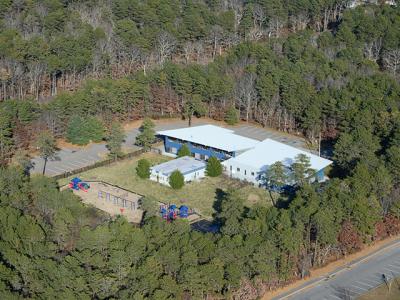East Hampton Town Set to Buy C.D.C.H. Building

The East Hampton Town Board plans a vote tonight to authorize a bond resolution for the purchase of the building on Stephen Hand’s Path that housed the Child Development Center of the Hamptons.
In a discussion at a meeting on Tuesday, board members and residents proposed a range of uses for the building, but the intention is for it to serve as a community center, with one or more nonprofit-organization tenants responsible for the building’s management. Such a move would align with the town’s policy to secure public-private partnerships with not-for-profit groups for unused buildings, in part to defray management and maintenance costs.
“The building lends itself to broad uses,” Supervisor Peter Van Scoyoc said, suggesting as one possibility a day care center, given the existing playground and classrooms used by C.D.C.H. He also pointed to “a need for a community meeting space for education purposes, lectures, performances. This structure,” he said, “really lends itself quite well to meeting all of those various needs.” The modular structure can be assembled in various configurations, he said. There are a “number of community groups and organizations which could utilize the space. . . . I do agree it’s better to have an organization that could independently manage that building for the greatest public benefit.”
Councilman Jeff Bragman said that the town should not rule out operation of a portion of the building. He
recalled remarks made by Mary Ella Moeller and David Gruber, during the public comment portion of the meeting, encouraging the inclusion of services for senior citizens and a place where they can integrate with the wider community. “Our 2016 engineering report said it was a perfect building for a senior center,” Mr. Bragman said. (Consideration had been given to move the town’s senior citizens center into the building from its location on Springs-Fireplace Road in East Hampton, but the proposal was abandoned and the town is planning to construct a new senior citizens center at its current location.)
Mr. Bragman also echoed a suggestion by Councilman David Lys that the board look to the Montauk Playhouse Community Center as a model for the former C.D.C.H. site. Mr. Lys also suggested allocation of space to serve as an incubator for resident-established small businesses, and wondered aloud if the board should examine the building’s use as a shelter during emergencies.
In the New Year, the town could issue requests for proposals, Michael Sendlenski, the town attorney, told the board, with one for use of the space and another for its management, if the board chooses.
Last month, Mr. Sendlenski explained to the board that the town could reach an agreement to cancel the lease it signed with the C.D.C.H., initially set for 30 years and scheduled to expire in 2032, and purchase the building for $800,000, less than a third of a recent $2.6 million appraisal.
On Tuesday, Len Bernard, the town’s budget officer, said that the bonds would likely have to be taxable, which will slightly increase the yearly debt service, from $45,000 for nontaxable bonds to $48,000. The board would vote to authorize the bond issue now but not actually borrow the money until August. The money to acquire the building would be advanced from the general fund, he said, and would likely be available around the end of January.
The 22,000-square-foot structure is deemed a Class B building, Mr. Bernard said, meaning it is of lesser value than the highest quality Class A designation given a new structure in a desirable location but greater than the Class C label given an old building in a less desirable area.
The metal structure is around 17 years old, Mr. Van Scoyoc said, and a report prepared by Drew Bennett, a consulting engineer, identified more than $400,000 in potential future repairs.
The C.D.C.H. opened as a charter school in 2001. It provided regular and special education programs, drawing students from local school districts, which paid tuition until it closed in 2016.
